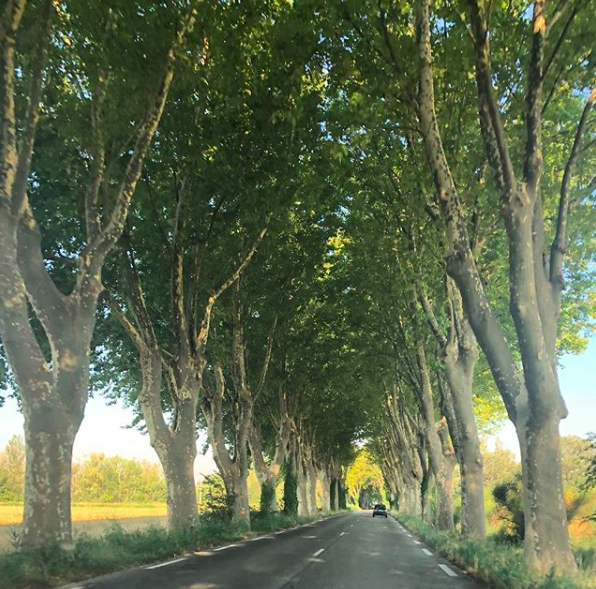218: Doubt the Default - How My Trip to France Woke Me Up
The Simple Sophisticate - Intelligent Living Paired with Signature Style - A podcast by Shannon Ables - Miercuri

Categories:
~The Simple Sophisticate, episode #218
~Subscribe to The Simple Sophisticate: iTunes | Stitcher | iHeartRadio | YouTube | Spotify

“A nail is driven out by another nail; habit is overcome by habit.” ― Erasmus
While traveling during the past four weeks in France, I found that I was finally able to default in conversation to a handful of expressions to, on the most basic level, demonstrate I comprehended what was being said - bien sur, absolutement, parfait, ouai, je comprends, merci, de rein, à demain. Again, as you can see, a very basic level. But, there was no longer a pause before I spoke whenever any of these words or phrases was warranted. My mind no longer had to think, I just spoke. In this instance, I was tickled. Finally, an aspect of the French language, after many years of sporadic studying, was becoming a default in my brain. A muscle had been strengthened to the point of habit. But, again, my responses were basic, simple, surface. "Doubt the default." When I heard Adam Grant utter this simple, concise, alliterative statement in his TED Talk about original thinkers, my attention was captured. It happened three years ago upon arriving in Bend and moving into my new home that I ran into a new neighbor. The circumstances were we didn't know each other, simply put, and I uttered in conversation with this perfect stranger, "trust me, I understand what you mean." At the time, I didn't think about that phrase before I said it, I didn't really consider the weight of such words - "trust me", I just said it out of habit. Default. And I wouldn't have even reflected upon this fact had the woman engaging me in conversation not said, "I don't know you to trust you." The topic of our conversation was about our dogs, but the truth was, she didn't know me, and she was fully present in the conversation. While I thought I was, the words I chose said otherwise. Ever since this conversation, I have thought carefully about what I say in conversations out of habit, filler, silence-enders, space holders. I have done my best to eliminate words such as "like" from my informal speech after I recognized how many times I would say it when, had you asked me, I would have guessed the word never entered into my syntax. Aside from the words I chose, I began to dive into my living habits, my thinking patterns, and it was with my trip to France that I recognized many cultural defaults as well that I had not even considered addressing. Quickly, another word for "default" is a habit. By definition, a habit is something that frees our mind up to focus on other tasks. So as long as the habit is helpful and contributes to the quality of the life we desire, a habit is a very good thing. Selecting water as your drink of choice, looking for the positive, smiling instead of frowning, wearing the same uniform to work to eliminate wasting time in the morning - all very helpful habits. But habits, defaults, can also be hindering our ability to live a better life, a more thoughtful life, a more engaging life, especially when we don't even realize we have these unhelpful defaults. Below I'd like to share with you a list of potential defaults already in your life inspired by what I saw, experienced as well as caught myself doing without thinking.
1. Not taking a grocery tote into the market
In France, when you go to a supermarket, they will not provide you for free with a plastic or paper bag to place your groceries. If you, as I did on my first occasion, do not bring in your canvas tote, market tote, or anything to carry your groceries, you will have to pay for their grocery bags (ones you can use on your next visit). The price was quite small - ten centimes - but it caught my attention immediately. A good habit could easily become ingrained in my memory of bringing a grocery tote to the store if I knew I would have to pay for a new bag each time I shopped throughout the week. (In one instance, I simply placed all of my groceries into my tote - handbag; and I also saw many people bringing their market baskets to the brick and mortar stores as well - multi-purpose.)
2. Expressing a negative energy during first impressions
When I travel, I love to listen. When I listen, I am better able to observe, and it also enables me to see more clearly, and more accurately, someone's true nature. What do I mean by this? Having had the opportunity to meet many people from all different walks of life, it was often the first impression that upon reflection was the most accurate to their true disposition. When we don't know someone, and the environment is safe, what is your first reaction when you meet them? Most of the people I met expressed warmth which made those few who did not stick out like a sore thumb. Because it is the first impression, their negative or positive energy has little or nothing to do with me, and much more to do with where they are in their life at that moment.
3. Driving faster than necessary
Driving on the roads in France, the country roads, the autoroutes and everywhere in between, it became quickly apparent that most French drivers drove the speed limit. I later had a conversation with Sharon Santoni about the laws of the road and my observation, and once she explained the drivers' point system (each Euro driver begins with 12 points and they can be lost for speeding (automatic surveillance along the roads), using a cell phone, etc.), it became clear as to why the pace of the roadways felt very civilized. No matter where in the world you drive, it would be interesting to consider the defaults you adhere to when you are behind the wheel. What is deemed acceptable, what is not? Buckling up - good. Glancing at your cell phone - bad. Driving a manual car during my entire trip which was something I am accustomed to, but my current car for the past four years here in the states is not a stick, upon arriving home, my left foot automatically began looking for the clutch without success. My brain had defaulted in four short weeks to expecting to use a clutch. This is good news. Not only can we change the defaults that are not helping us, but they can be "reprogrammed" quite quickly with frequent, repeated practice.
4. Not greeting the shop keeper, artisan, taxi driver, etc.
The many travel writers and travelers of the world, have done a magnificent job of sharing the importance of saying "bonjour" if one is in France, but in nearly every other country in the world as well, upon entering any business, vendor, etc. in order to begin to set a cordial tone. From time to time, I would notice a traveler, in my case, I zoomed in on Americans, but that's not to say other world citizens don't make the same mistake as well, immediately begin making an inquiry of the proprietor without extending a salutation. And while often, the staff would attempt to help them, an opportunity to build a better rapport was missed. I began thinking about this simple habit of focusing first on the human connection before homing in on the task which brought us to the store, market, etc. The difference is there are feelings and emotions involved that must be considered when we choose to first focus on making a human connection. And when we do this, we are being present. No, we do not know how the interaction will go, but the chances that it will go well are greatly increased.
5. Assuming a market will always be open
I quickly learned that I needed to plan my grocery shopping well before my stomach became hungry. While this detail was something I remembered from my previous trips, staying in vacation rentals, I usually wanted to cook my own meals, so making sure a market of some sort was open (restaurants are usually opened each day of the week for at least lunch and dinner) was a shift from my approach in the states. In the states, if I have forgotten an ingredient for dinner on a Sunday, I don't think twice about heading to the market for a quick pick up. Having to know in some capacity that I had what I needed for my meals in advance also enabled me to just relax and enjoy a leisurely Sunday or any afternoon during the week as the outdoor markets wrapped up around 1pm and most restaurants in the small towns shut down between lunch and dinner.
6. Eating the same food year round
In Provence, the melons were nearing their peak ripeness, but green asparagus season was all but over. White beans were a treasure to be purchased and savored during these months strawberries were to indulge upon like candy. However, if I were to return in November, as most of the markets are opened year-round, I would see completely different selections. Now, we know the seasons offer different fruits and vegetables, even seafood, but it can sometimes become easy to forget when we shop in a supermarket and only stick to the same food each trip. The appreciation for the food that only comes once a year is something we can celebrate in our cooking as we dine on the rich flavors. In so doing, we actually do help our waistline as we become satiated more quickly and do not overeat as we are eating real food with natural, wonderful flavor.
7. Perfect and impersonal
The idea of a perfect home, a perfect outfit, perfect hair, a perfect life, as we know is a futile pursuit. And to this point, most intensely, it was the decor that woke me up throughout this trip as I appreciated the signature touches made available by the treasures one can find at the many brocante markets. Now this is not to say, one cannot decorate a home outside of France without the access to brocantes. Absolutely not, but what I think is tempting is to make everything look ideal immediately in our homes - paintings, furniture, tabletop vignettes, etc. And as Sharon Santoni and I were talking, a beautiful home that is the sanctuary for the inhabitants is one that has layers of unique and thoughtful decor choices, and these layers take time. When I stepped foot onto Sharon's property, enjoyed meals with her family, and stayed in her guest cottage, it was immediately clear that they lived there. I couldn't purchase her decor details", but I could be inspired by them because it was more than the things, it was the stories that came with them.
8. Speedy and surface conversations
As I shared at the beginning of my post, it can be easy to say certain catch phrases without really thinking about what the words themselves mean. While idioms exist in every culture, sayings that mean more than what they are literally saying, it's not the idioms I am talking about here. When we are in a different culture that asks of us to reach beyond the language we are most comfortable with, often the conversation can be slow. While this may be frustrating as we want to talk quickly like locals, it shows thoughtful care. We want to make sure what we wish to say is said and not something that will offend or confuse. I find that sometimes in conversations we say more words than our necessary. Just as in every other arena of our lives, quality over quantity. When we choose our words carefully, we can say so much more. Excessive use of superlatives (best, largest, toughest, most amazing, prettiest) waters down the actual compliment if all you use are superlatives for something you either love or loathe. Precise words and thoughtful timing of when we engage in conversation, demonstrates we are listening, we care and we are trying to understand.
9. Drama is necessary and thus inevitable
Initially, it was my lack of access to the regular news sources I look to or listen to on a typical day when I am in the states that made me realize that I had been accepting the noise of problems, clashes and pain as normal. But even with the shows and books we read, we can come to expect, even look for, the clash, the conflict, the drama, that must be there somewhere. The truth is, often things to work out. In fact, it is human nature biologically to remember the instances that didn't work out more readily than the times that did for survival. But when we accept this biology, we ignore that when we are aware of why this happens, we can shift our expectations, our reactions and instead rest more easy, enjoy the steady, even balance of our lives that go well quite often. Why look for the drama when it truly doesn't need to be there?
10. Assuming an incapability
I can't travel alone. I can't drive in another country. I can't live without [insert something that you cannot travel with]. Often when we travel we discover something, if not many, things about ourselves we were not consciously aware of. Many of these discoveries are awesome, exciting bits of information that awakens us to our best selves, but sometimes we discover that we have been limiting ourselves unnecessarily. If our default in our minds is "I can't" instead of even just "I'll give it a shot" when a new task or new experience is placed in front of us, we may miss out on the most beautiful London plane trees lined country roads in France (see below), or meeting Walter Wells (I ended up after attempting to walk to class at Patricia Wells' cooking class the first night, getting lost, and ended up calling Walter who came and found me and picked me up in his car to take me to their property for dinner - we had a lovely conversation). We often sell ourselves short regarding what we are truly capable of doing, and we especially do so when our default setting is immediately "I can't". Yes, you can. You may have to do a bit more homework, save a bit more money, or have some patience, but "I can't" is often more an expression of hoping that we could so badly but we just don't know how. 
"Default choices often remain unchanged for no reason other than being the default, either because of this lack of information or humans' status quo bias." —Marvin Ammori
Adam Grant was right, we should doubt our defaults because when we don't we are either living unconsciously or not living as full of a life as we could if only we had more information to make different choices and take different actions. Kristin Armstrong states it frankly, "We either live with intention or exist by default." When we live with intention, we are living well. We may not have success on our first attempts at speaking differently, acting differently or engaging differently, but we are doing it out of a conscious choice to live more authentically, thoughtfully and more engaged with the world we are living. While traveling to France made this concept of living with defaults quite glaring to me, we don't have to travel outside of even our own town to know that we may have defaults that are not serving us or defaults that are limiting our full potential whether it be in our appreciation of life, our relationships, even our success at work. All it takes is a choice to reflect and ponder, why do I greet people the way I do? Is that the energy I want to extend? If so, that's awesome, but if you recognize you want to make a change, you can do that too. When we doubt the default, we are choosing to be selective about the habits we allow to be habits in our lives. It's when we do not know we have these habits that we step on our own toes, so to speak, and trip ourselves up without realizing we are the ones slowing our progress down. And that is great news, we each have the skills and the opportunity to stop tripping and start striding into the life we love living. ~SIMILAR POSTS/EPISODES YOU MIGHT ENJOY:
~20 Ways to Live Like a Parisian, episode #127
~15 Everyday Habits to Live a Life of Contentment, episode #93
~Why Not . . . Live a Life of Quality?
~Listen/Read more French-Inspired podcast episodes here. ~Learn more and subscribe to TSLL's weekly newsletter here.
Petit Plaisir:
~Filt shopping bags (made in Normandy, France)
- more colors here and here
- A net and rope company based in Caen, France, since 1855 with a goal of creating environmentally-friendly products.

~Sponsor of today's episode:
- Lola
- Use promo code SOPHISTICATE to save 40% off all subscriptions
